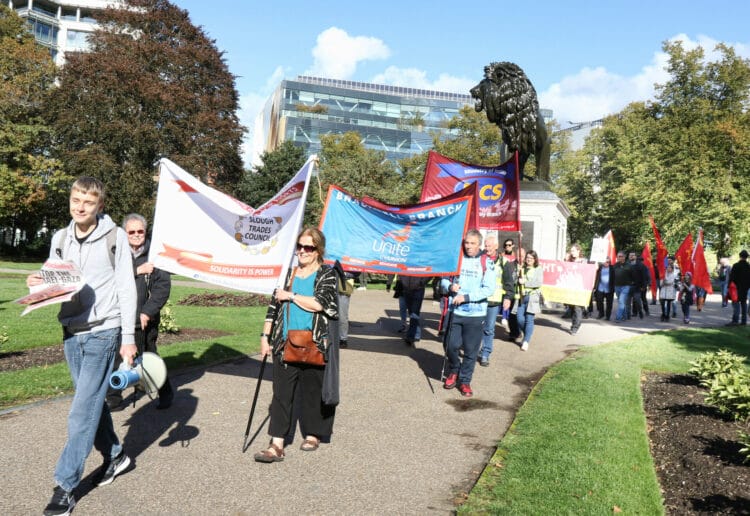READING Trade Unions Council held a rally in Reading on Saturday to voice their opposition to the Minimum Service Levels Act and other anti-trade union laws.
RTUC called for trade union members and workers, as well as members of the public, to join them in opposing the legislation at the rally, which saw speakers representing a wide range of trades unions, including PCS, NEU, FBU, ASLEF, RMT, BMA, GMB, Unite Community, and others.
After assembling on Forbury Gardens, attendees marched through town to the rally on Chatham Street.
Danny McNamara, executive committee member of Reading Trade Unions Council, said: “The legislation places restrictions on the ability of workers in key public services to strike and withdraw their labour.
“It does that by giving ministers the ability to specify arbitrary service levels which must be observed and allowing employers to name employees who must show up on strike days.
“It would also allow employers to exposing employees who fail to cooperate to the risk of being sacked and to expose trade unions who support them to legal action.”
He explained: “The RTUC felt that it was appropriate and important for us to stage a local protest, to show our opposition to this- not in isolation, but really as the culmination of a series of legislative measures over decades that increasingly have placed important and undesirable limits on the ability of workers freely to strike.
“I don’t think we’ve seen anything quite like this before- we’d need to ask a labour historian, but I’m not familiar with anything comparable to this legislation.
“Historically trade unions over 100 years or more have progressively built up the ability to take strike action and won a lot of rights for workers.
“These include recognition agreement, bargaining rights, defences against sacking, working hour protections, holiday protections– and it seems that these things are slowly being unwound by a series of legislative measures going back really to the 1980s.”
He said that the flexibility of the legislation was of concern, too: “One key thing here is that the minimum service level that it could stipulate is not defined in the legislation.
“It’s very much up to the minister to make a judgement at the time, and so there is a big variable at the heart of the legislation.
“But it certainly would cover education, health, transport, and potentially could cover key public services- so the footprint, that is the number of services and potentially the number of employees affected, could be very large indeed.”
Speaking about the level of support the event saw, he said: “With recent global events, there were other demonstrations going on elsewhere, so taking into account we had a good turnout.”
{{{gallery:”135078,135079,135080,876797,876799,876801,876803,135081,135082,135083,876824,876826,876828,876830,135084,135085″}}}
























